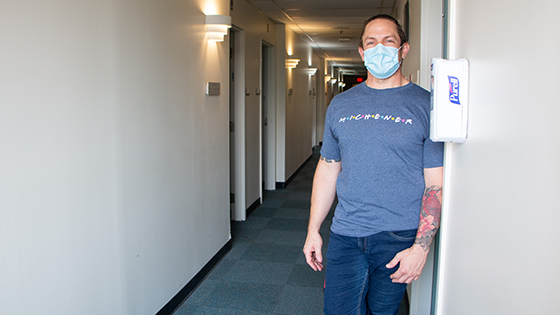Erica Susky was the first member of UHN to use the COVID-Positive Quarantine Accommodations (CQA) at UHN’s Michener School of Applied Health Sciences. After being diagnosed with COVID-19 in April 2020, she spent 14 days in Room 469 on the fourth floor of the Michener student residence. (Photo: UHN)
University Health Network’s Michener School of Applied Health Sciences is hoping for a little normalcy this year as it safely welcomes first-year students back to residence this fall.
The 2020-2021 school year, filled with lockdowns and public health restrictions due to the COVID-19 pandemic, saw many classes move online, resulting in some students leaving the campus residence.
With the decrease in student residents, UHN reserved the fourth floor as COVID-Positive Quarantine Accommodations (CQA), leaving 11 single occupancy rooms open for any UHN staff who tested positive and couldn’t quarantine at home. The CQA opened in April 2020 and officially shut down Aug. 1, 2021, returning the fourth floor to student use for the upcoming school year.
“This is a success story,” says Ron Swail, UHN’s Vice President of Facilities Management – Planning, Redevelopment & Operations (FM-PRO), whose department oversaw the logistics of the CQA, while the Princess Margaret Lodge managed enrolment.
“The program was very important when it started early on in the pandemic, but now with most staff vaccinated, there isn’t as much interest in the program, so we’re excited to welcome students back to the fourth floor,” Ron says.
There are 360 first-year students at Michener but only 47 rooms available in residence – including the 11 re-opening on the fourth floor – so the return to full operation was needed, says Raymond Nielsen, Director of Student Success Network and Clinical Education at the Michener Institute of Education at UHN.
“Typically there’s always a waitlist for the Michener residence,” he says. “This year, it will be close to 100 per cent occupied as of September 1.”

To transition the floor to CQA, FM-PRO staff rolled out a number of IPAC measures, including the removal of furniture that couldn’t be disinfected and arranging for food and personal deliveries to be sent to occupants’ doors every day. Fortunately, the rooms were already equipped with separate heating and air conditioning, as well as private bathrooms.
There was even an “airtight plan for how someone would be brought in,” adds Raymond.
“There was no ability for people to even pass in the hallway when they moved in … as soon as someone came into the building, the elevator had to be grounded and we had enhanced cleaning protocols.”
Erica Susky, infection control practitioner at Toronto Western Hospital, was the first TeamUHN member to use the CQA after she was diagnosed with COVID-19 in April 2020.
“I live in a small condominium with my son and my partner,” says Erica. “People who live in the suburbs might have spare rooms, but staff who live in Toronto proper – so few people are able to have separated living quarters if you test positive.
“[The CQA] was a good option to have, because certainly a lot of work places wouldn’t do that.”
IPAC protocols remain in place
Once she received her positive test results, Erica was safely escorted to Room 469 on the fourth floor.
As an infection control practitioner, she was impressed by the IPAC protocols.
“I was quarantined in the most accurate sense – I couldn’t leave the room,” says Erica. “That was rough for me, but the people working at Michener were rather understanding.
“They got me things that I needed – like coffee.”
While the fourth floor has been returned to students, IPAC protocols remain in place. For example, there’s increased cleaning, disinfectant stations, maximum occupancy and Plexiglas in common areas, as well as strict physical distancing and masking rules – the only area students are allowed to be unmasked is in their own room, alone, with the door closed.
All students and staff must also be fully vaccinated.


